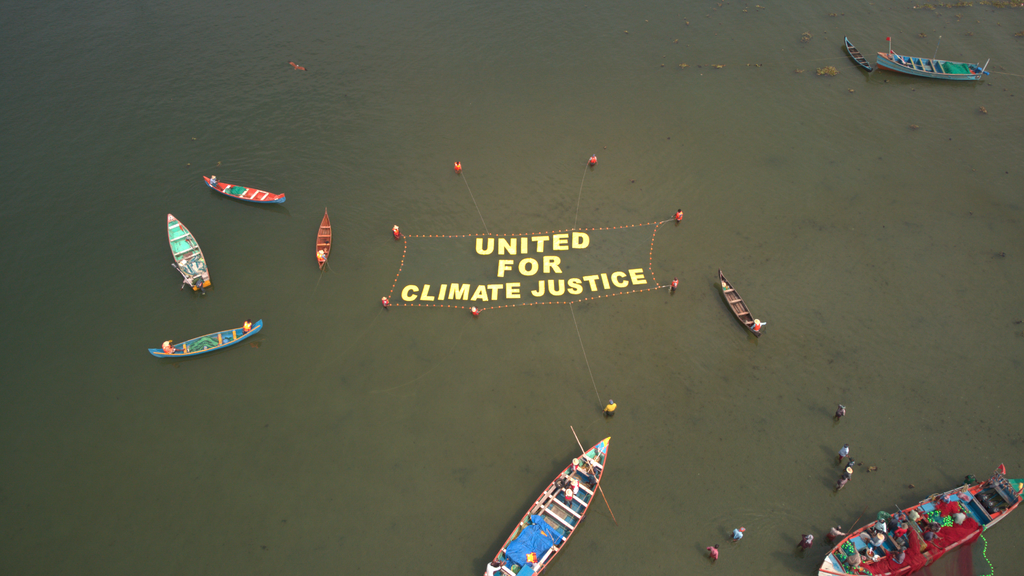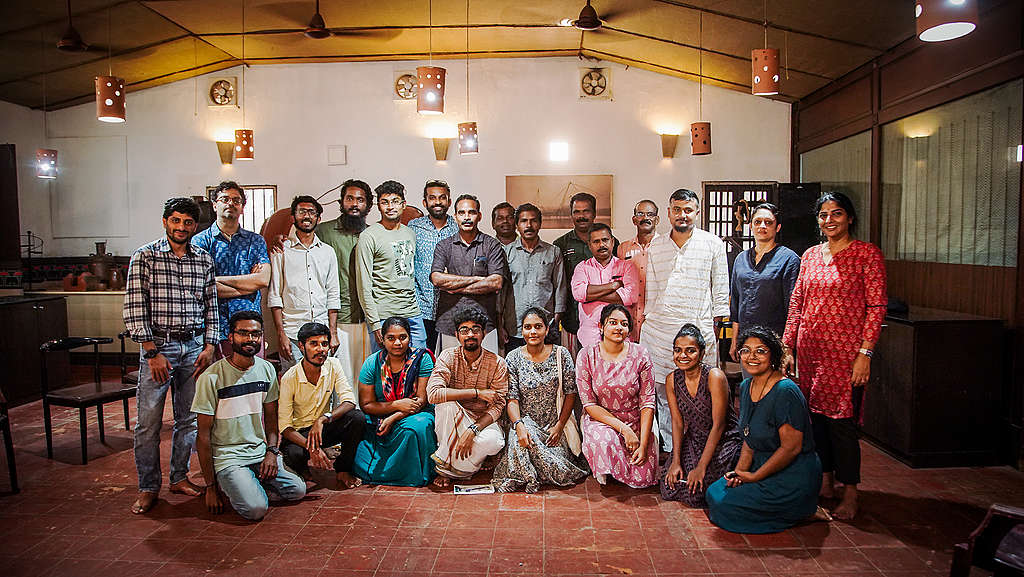COP27 is set to be held from 6th to 18th November in Egypt as countries come together to discuss their collective climate goals. As a response to COP27 and the unfolding climate crisis, on November 8th, Greenpeace India along with Kerala fishing communities unfurled a 27 ft-by-60 ft banner on the open waters of the Chellanam Harbour, one of the worst erosion-impacted coastlines, which read “UNITED FOR CLIMATE JUSTICE”. The aim is to highlight the increasing impacts of climate change and to demand climate justice at COP27. Through this photo-op, impacted fishing communities demanded action from those in power to match the efforts of vulnerable communities and climate justice movements in fighting climate change.
The public action was part of three events organised at Fort Kochi and Chellanam, Kerala, from 5th to 8th of November 2022. The events witnessed critical stakeholders from vulnerable communities across India coming together to express solidarity and challenge the inaction on climate change by country leaders and world leaders. This is a crucial step in the fight for climate justice, as historically marginalised communities, though having the least contributions towards causing the climate crisis, are the most affected by extreme global warming-induced weather events.


“We have put out this message because it is high time the world sees the real-time impact of climate change. We are losing our homes and livelihoods to erratic weather events. Fishing is our only source of income, and it is becoming increasingly challenging to go out into the sea, make a living and feed our families. Political leaders across the world have wasted enough time. Now, there should be quick, real solutions to our problems. The world needs to know our story.” said Anthony Thayil, KSMTF Erakulum District President.
The key objective of these events was to create momentum and public conversations towards demanding a scientific and community knowledge-driven Climate Adaptation Plan across India. The community members sent the message that they are facing the brunt of climate change already and, at the same time, are stepping up to create spaces for solidarity, hope and resilience. They demanded that their actions should be backed up by the state and society members as they continue to work on radical hope.
Avinash Chanchal, Campaign Manager at Greenpeace India, commented, “The latest IPCC reports highlight the widespread losses and damages to nature and people being caused by the climate crisis. Our climate adaptation policies must align with climate justice and acknowledge that this crisis disproportionately affects marginalised and underprivileged populations and, therefore, ensure that their lives and livelihoods are protected. Furthermore, we will require immediate changes at a systemic level to rapidly decarbonise our economies. Ambitious declarations without any impactful implementation is essentially hollow talk, and must be called out as such.”
The programme’s participants included farmers from Maharashtra who faced drought and excess unseasonal rainfall, fishworkers and coastal dwellers from Chellanam, inland fish workers and residents of the Sundarbans, youth from fishing communities of Kerala and Tamil Nadu, and the survivors of the 2018 floods in Kerala who were rescued by the Chellanam fishing community.
Two other events that took place were the following:
- Roundtable Conference:
Parallel to (and in response to) COP 27, Greenpeace India conducted a Roundtable Conference at Fort Kochi on 8th November. The conference hosted eminent speakers from various stakeholder groups with a special emphasis on impacted communities. The participants discussed critical issues around climate change such as vulnerability, climate adaptation, the relevance of community action and citizen’s movements, loss and damage, and climate justice.
The speakers included Jackson Pollayil, State President, Kerala Independent Fish workers Federation; Hibi Eden, MP, Ernakulam; Lalit Babar, Ambedkar Sheti Vikas Sansodhan Sanstha; Sankar Haldar, Director, MUKTI (Sundarbans) and impacted community members from the Sunderbans. The main demand from the event was climate justice for the most vulnerable, linked to responsibility and accountability. Ernakulam MP Shri Hibi Eden offered space to raise questions in the winter parliament session, which added strength and hope to the gathering.
Jackson Pollayil, State President, Kerala Independent Fish workers Federation said, “It is important to have these conversations around community resilience and adaptation to extreme weather events and climate change. Fishermen from Chellanam have been experiencing increasing frequency and intensity of cyclones and rising sea levels. And I can see there are several other communities here who are experiencing varying degrees of the climate crisis. These disasters should not be looked at as individual freak incidents anymore, and instead should become part of the global discourse on Loss and Damage and climate adaptation.” - Youth Storytelling Workshop:
Between 5th to 7th November, Greenpeace India conducted a storytelling workshop in Kerala for youth community members who have been at the forefront of climate change resilience in Kerala.
As first-line respondents in many situations, the participants were encouraged to document and retell climate stories in realtime to bring out community-based climate resilience stories. Through sessions held by various resource persons, the participants were enabled to respond to climate change and related events through photography, videography and content creation for social media and digital platforms.
Greenpeace India is pushing to work with communities that are the first witnesses of climate change to collectivise their voices — and sees it as imperative that their stories are documented and told by the communities members themselves. The workshop paved the way towards active engagement of the youth and members of the stakeholder communities in Kerala and India.
“We should act if we want to save ourselves. Nature knows how to pay back for the atrocities we commit against her. We are not indispensable, it’s the other way round. Let us realise that, the sooner the better.” says Dr Shahina Rafeeq, writer and workshop participant.
With these events, Greenpeace India aims to create urgency and build solidarity among impacted communities and climate justice movements. This will help to amplify the voices of those most affected by climate change and send an affirmative call-to-action on the need for fast-tracking climate adaptation for vulnerable communities.
Contact Details:
Avinash Chanchal, +91 8882153664, [email protected]
Nischita Verrendra, +91 9845828096, [email protected]
Kshema Varghese, +91 8304952289, [email protected]
